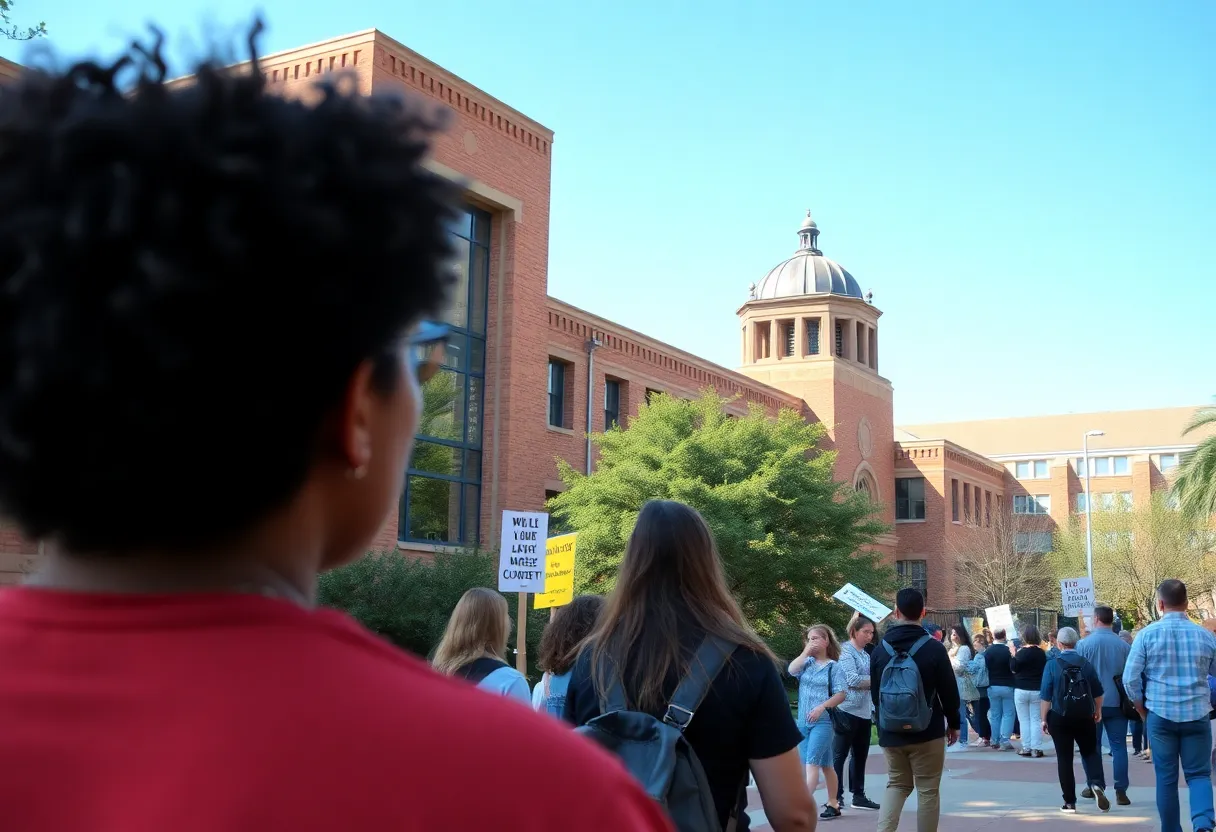News Summary
Tucson Mayor Regina Romero has praised the University of Arizona’s decision to reject the federal Compact for Academic Excellence, citing the importance of academic autonomy. During a recent Arizona Board of Regents meeting, students raised concerns about proposed changes to public comment procedures that could limit their participation and advocated for improved campus safety measures following a tragic incident. The discussion emphasized the need for collaboration between the university and the community to enhance student welfare and safety.
Tucson Mayor Applauds UA’s Rejection of Federal Compact Amid Student Advocacy for Safety and Public Comment Rights
Tucson, Arizona – In a recent Arizona Board of Regents meeting at the University of Arizona (UA), Tucson Mayor Regina Romero commended the university’s decision to decline the federal Compact for Academic Excellence in Higher Education, emphasizing the importance of academic autonomy. Concurrently, students urged the Board to reconsider proposed changes to public comment procedures and to enhance campus safety measures.
Mayor Romero’s Support for UA’s Decision
Mayor Romero opened the public session by praising UA’s choice to reject the federal compact, viewing it as a stand for academic independence. She highlighted the necessity for public universities to pursue research and service without succumbing to political pressures in exchange for funding. Romero also stressed the need for collaboration between the university, city, and regional partners to improve transportation safety, particularly in light of a recent tragic incident where three students were killed at a crosswalk on Euclid Avenue.
Student Concerns and Advocacy
During the meeting, students voiced several concerns:
- Public Comment Procedures: Proposed changes would require individuals to submit a request to speak an hour before the meeting, potentially limiting student participation. Students advocated for a more accessible sign-up system to ensure broader engagement.
- Campus Safety: In the aftermath of the October 30 incident, students called for improved safety measures, including better insurance coverage for graduate students and enhanced transportation infrastructure to prevent future tragedies.
Financial Health and Strategic Goals
Board officials provided updates on the financial status of Arizona’s public universities, noting declines in enrollment-driven revenue and the impact of reduced federal research funding. UA President Suresh Garimella outlined strategic goals to boost student retention, graduation rates, and research output, aiming to balance tuition revenue with expanded access to education.
Background on the Federal Compact
The Compact for Academic Excellence in Higher Education, introduced by the Trump administration, offered universities preferential treatment for federal funding in exchange for adopting specific policies, including tuition freezes, caps on international student enrollment, and restrictions on considering race or gender in admissions and hiring. UA’s decision to decline the compact aligns with its commitment to principles such as academic freedom, merit-based research funding, and institutional independence.
Key Features Summary
| Key Feature | Description |
|---|---|
| Mayor’s Support | Mayor Regina Romero praised UA’s decision to reject the federal compact, emphasizing academic autonomy and the need for improved transportation safety. |
| Student Advocacy | Students expressed concerns over proposed changes to public comment procedures and called for enhanced campus safety measures following a recent tragic incident. |
| Financial Updates | Board officials discussed declines in enrollment-driven revenue and the impact of reduced federal research funding, with UA outlining strategic goals to boost retention, graduation rates, and research output. |
| Federal Compact Background | The federal compact offered universities preferential treatment for federal funding in exchange for adopting specific policies, which UA declined to preserve its commitment to academic freedom and institutional independence. |
Conclusion
The University of Arizona’s decision to reject the federal Compact for Academic Excellence underscores its commitment to academic independence and research integrity. It also highlights the ongoing dialogue between administrators, students, and city officials regarding campus safety and participatory governance. Moving forward, collaboration between the university and community stakeholders will remain vital to enhancing campus life and ensuring student welfare.
Explore More
Readers are encouraged to explore more university programs and engage with campus events to remain informed on developments within Phoenix’s vibrant college community.
FAQ
What is the Compact for Academic Excellence in Higher Education?
The Compact for Academic Excellence in Higher Education is a proposal by the Trump administration offering universities preferential treatment for federal funding in exchange for adopting specific policies, including tuition freezes, caps on international student enrollment, and restrictions on considering race or gender in admissions and hiring.
Why did the University of Arizona reject the federal compact?
The University of Arizona rejected the federal compact to preserve academic freedom, merit-based research funding, and institutional independence, aligning with its commitment to these principles.
What concerns did students raise during the Arizona Board of Regents meeting?
Students raised concerns about proposed changes to public comment procedures that could limit participation and called for enhanced campus safety measures, including better insurance coverage for graduate students and improved transportation infrastructure.
Deeper Dive: News & Info About This Topic
HERE Resources
University of Arizona’s Grad CAFE Expands Support for Graduate Students
Grand Canyon University Men’s Basketball Secures Victory
GCU Basketball Triumphs Over Northwestern State
Upcoming Health Events in Phoenix, AZ – November 2025
2025 Arizona Wildland Urban Interface Summit Announcement
Phoenix Weather Update: Sunny and Warm for Halloween
Arizona Takes Action on AI Concerns in Education and Workforce
Arizona’s Initiative to Support Small Business Financial Planning
Man Hospitalized After Stabbing in Downtown Phoenix
A Tribute to Betsy Mae Quan Toy Yee: Educator and Philanthropist
Author: STAFF HERE PHOENIX WRITER
The PHOENIX STAFF WRITER represents the experienced team at HEREPhoenix.com, your go-to source for actionable local news and information in Phoenix, Maricopa County, and beyond. Specializing in "news you can use," we cover essential topics like product reviews for personal and business needs, local business directories, politics, real estate trends, neighborhood insights, and state news affecting the area—with deep expertise drawn from years of dedicated reporting and strong community input, including local press releases and business updates. We deliver top reporting on high-value events such as the Waste Management Phoenix Open, Cactus League Spring Training, and Arizona State Fair. Our coverage extends to key organizations like the Greater Phoenix Chamber of Commerce and Visit Phoenix, plus leading businesses in technology and healthcare that power the local economy such as Intel and Banner Health. As part of the broader HERE network, including HERETucson.com, we provide comprehensive, credible insights into Arizona's dynamic landscape.





